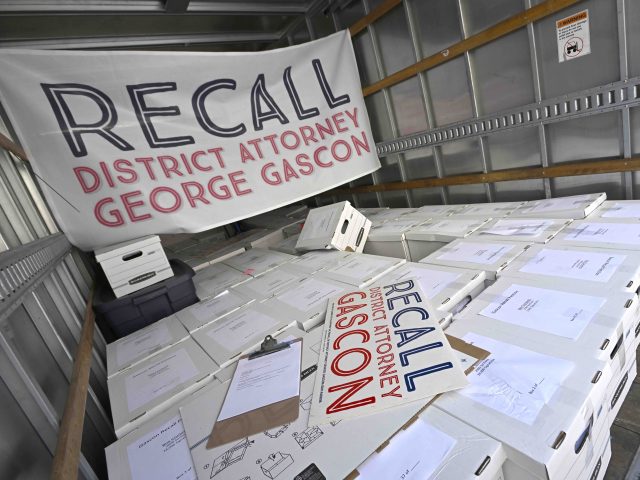A spokesperson for Los Angeles County told Breitbart News on Tuesday morning that the wide disparity in rejection rates for a petition to recall District Attorney George Gascón, versus vote-by-mail ballots, can be explained by procedural differences.
Gascón, a proponent of criminal justice “reform” who was elected in 2020 after millions of dollars in outside spending, including by left-wing billionaire George Soros, has faced two unsuccessful recall attempts thus far.
The latest recall petition failed Monday, after over 27% of the 715,833 signatures submitted to force a recall vote were rejected, leaving the campaign 46,807 short of the required 566,857 signatures (amounting to 10% of the registered voters in L.A. County).
In the 2020 election, L.A. County rejected less than 1% of the vote-by-mail ballots submitted, raising questions about possible disparities in the review process.
But county spokesperson Mike Sanchez said that the comparison is not “apples to applies.”
He said that the standard is different because the process is different.
“Vote-by-mail is not a petition,” Sanchez told Breitbart News. “[Vote-by-mail] is based purely on the signature of that voter and matching that signature, whereas a petition — those are circulated and gathered through committees in a variety of different ways, so we have to verify that voter’s registration.”
Those who submit vote-by-mail ballots are presumed to be registered to vote. There is a similar presumption for those who sign recall petitions, he said, but each individual signatory’s voter registration is checked, as well as the address given.
Moreover, he said, signatures on vote-by-mail ballots are first checked by an automated machine; only those that are flagged by the machine are reviewed.
Signatures on recall petitions, in contrast, are each checked manually by human beings.
“Vote-by-mail is slightly different, given the volume,” Sanchez explained. Each ballot received by mail “goes through an automatic signature verification device, and when a signature gets challenged … that goes to a human review.”
Petition signatures, he said, “go through multiple checks. If there’s anything that’s challenged, it gets reviewed … up to four times, which exceeds the legal requirement.”
Sanchez added that there were internal manuals providing the different procedures checking vote-by-mail ballots and for checking recall petitions, but was unsure if these were public.
Asked whether the public should have been allowed to observe the process of verifying petitions, Sanchez said that state law prohibits observers when petition signatures are verified, partly to protect the identities of those signing the recall petitions.
In the 2021 gubernatorial recall election, L.A. County rejected 19% of the signatures submitted to recall Gov. Gavin Newsom. It it not yet clear why the error rate was so much lower for the gubernatorial recall versus the recall of the district attorney.
Sanchez noted that recall proponents had up to 21 days from Aug. 15 to review the rejected signatures, but could not challenge the decisions of county officials, which were final. He could not comment on potential litigation over the recall.
Joel B. Pollak is Senior Editor-at-Large at Breitbart News and the host of Breitbart News Sunday on Sirius XM Patriot on Sunday evenings from 7 p.m. to 10 p.m. ET (4 p.m. to 7 p.m. PT). He is the author of the recent e-book, Neither Free nor Fair: The 2020 U.S. Presidential Election. His recent book, RED NOVEMBER, tells the story of the 2020 Democratic presidential primary from a conservative perspective. He is a winner of the 2018 Robert Novak Journalism Alumni Fellowship. Follow him on Twitter at @joelpollak.

COMMENTS
Please let us know if you're having issues with commenting.